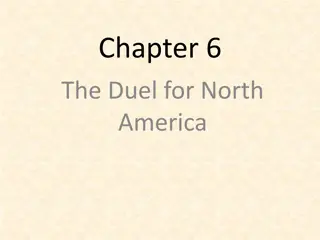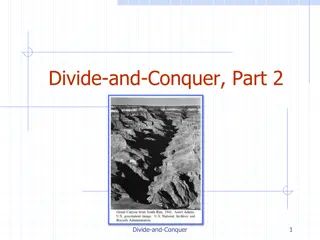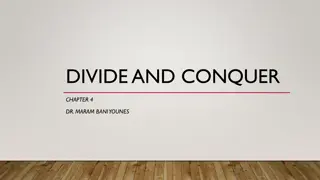The Growing Divide: North vs. South in Antebellum America
Economic disparities between the agrarian North and the slave-dependent South led to growing tensions, with the North's industrial progress conflicting with the South's reliance on plantation economy and slave labor. Disputes over slavery, territorial expansion, and political power further fueled the divide, culminating in the rise of the Free-Soil Party opposing the spread of slavery.
Download Presentation

Please find below an Image/Link to download the presentation.
The content on the website is provided AS IS for your information and personal use only. It may not be sold, licensed, or shared on other websites without obtaining consent from the author.If you encounter any issues during the download, it is possible that the publisher has removed the file from their server.
You are allowed to download the files provided on this website for personal or commercial use, subject to the condition that they are used lawfully. All files are the property of their respective owners.
The content on the website is provided AS IS for your information and personal use only. It may not be sold, licensed, or shared on other websites without obtaining consent from the author.
E N D
Presentation Transcript
Chapter 15 THE NATION BREAKING APART: (1846 1861)
Tensions Rise Between the North and South: The economies of the North and South had been developing differently ever since colonial times, though both were mainly agricultural, the small farms in the North could not compare to the plantations in the South The North developed more industry and commerce, while the South depended on slave labor Those economic differences between the two sections began to divide the nation politically Growing industries of the North attracted many immigrants, as well as cities grew, immigrants moved west, they built farms in new states that carved out the Northwest Territories, canals and railroads ran east and west, strengthening ties between Eastern and Midwestern states Some opposed slavery because they saw it as immoral, other saw it as a economic threat, because slaves didn t work for pay, wage workers feared that enslaved labor would replace them In the South a small class of wealthy planters dominated the Southern politics, they made great profits from slave labor, which much came from trade from exports of cash crops, like cotton, and invested in slaves instead of industry
Tensions Rise Between the North and South Cont : Most small farmers in the South resented the powerful plantation owners, but poor whites still accepted slavery, because it gave them a feeling of social superiority Northern criticism of slavery increased, slave holders defended their way of life, and justified that whites were superior to African Americans, also that it helped introduce Christianity, as well as providing them food, clothing, and shelter.
Slavery and Territorial Expansion: After the Missouri Compromise in 1820, political disagreements over slavery faded, until the War with Mexico in 1846 Northerners feared Southerners wanted to make the Mexico Territory to extend slavery, and upset the balance between free and slave states David Wilmot, of Pennsylvania proposed a bill, the Wilmot Proviso outlaw slavery in any territory the United States might acquire from the War with Mexico, it passed the House of Representatives, but failed to pass the Senate Though it led to the creation of the Free-Soil Party a political party dedicated to stopping the expansion of slavery, it slogan was Free Soil, Free Speech, Free Labor, and Free Men
The Compromise of 1850: By 1848, the nations leaders began to debate how the lands gained from the War with Mexico would deal with slavery With the discovery of gold in California, it would have enough people to apply for statehood, the South wanted to cut it in half, making half a free state and half a slave state California could not become a state with Congress approval, and Senator Henry Clay, of Kentucky, crafted a plan to settle the problem: To please the North, California would become a free state and Washington D.C. would abolish slave trade To Please the South, Congress would not pass laws regarding slavery in new territories, and Congress would pass stronger laws to help slaveholders Both sides felt they were giving up too much, some tired of sectional bickering, just wanted to preserve the Union Stephen A. Douglas, was put in charge of finding a plan that would end this The Compromise of 1850, was an attempt to calm the political situation, but one bill heightened it, rather than calm it
The Crisis Deepens: The Fugitive Slave Act under this law, accused fugitives could be held without an arrest warrant and no trial by jury Southerners backed it because, they considered slaves property, it required Northerners to help recapture escaped slaves, also places penalties on people who would not cooperate, allowed Southerners to catch slaves that roamed the North Harriet Beecher Stowe abolitionist writer, her anger over the act inspired her to write Uncle Tom s Cabin, in 1852, the novel presented the cruelty and immorality of slavery, it describes the escape of slave Eliza and her baby across the Ohio River
Violence Erupts: As political tensions rise, the issue of slavery in territories brought bloodshed to the West and even Congress itself In 1854, Senator Douglas drafted a bill to organize the Nebraska Territory called the Kansas-Nebraska Act it proposed to divide the territory into two parts, Nebraska and Kansas To get the South to support he proposed popular sovereignty, a system that allows the residents to decide/vote if they are a free state or a slave state, how ever if the bill passed it would mean the destruction of the Missouri Compromise, and angered opponents of slavery but passed Few realized that the Kansas-Nebraska Act would turn Kansas into a violent and bloody battleground over the issue of slavery
Bleeding Kansas: During the election of 1855, there were more proslavery than antislavery settlers in the Kansas Territory, after about 5 thousand residents of neighboring Missouri can and voted illegally, the Kansas legislature was filled with proslavery representatives Antislavery settlers rejected the elected government, settlers on both sides armed themselves, and in May, a proslavery mob looted the town of Lawrence, Kansas, and was called the Sack of Lawrence In response, John Brown, an extreme abolitionist, led 7 other men in a massacre of 5 of his proslavery neighbors, and is known as the Potawatomie Massacre, after the bodies were found, the news of violence spread, and civil war broke out in Kansas, it continued for 3 years, the territory became know as Bleeding Kansas In may 1856, Senator Charles Sumner, of Massachusetts, spoke against the proslavery forces in Kansas, Sumner in his speech insulted A.P. Butler, Preston Brooks, a relative of Butler, beat Sumner unconscious with his cane, and disabled him for year The antislavery forces united to create the new political organization the Republican Party
Slavery Dominates Politics: The Kansas-Nebraska Act now let residents of a new territory voted for either or against slavery, which caused political crisis for the Whig Party formed in 1834, to oppose Andrew Jackson, the act began to tear the party apart Southern Whigs supported the act, Northern Whigs opposed it, and the party split into 2 factions Southern Whigs joined the Democratic Party, while Northern Whigs joined the Republican Party In the 1856 election, Republican nominated John C. Fr mont, the Democrats nominated James Buchanan, and the Know-Nothing Party nominated Millard Fillmore, Fillmore had been president following Zachary Taylors death from 1850 to 1853 The election turned into 2 different races: Buchanan against Fr mont, in the North, and Buchanan against Fillmore, in the South Buchanan won, carrying all slave states, except Maryland, and several Northern states The results showed 2 things, the Republican Party was a major force in the North, Fr mont won 11 Northern states, and slavery was dividing the nation along sectional lines
The Breaking Point: The issue of slavery was affection not only Congressional politics, but it was forcing its way into the judiciary branch Dred Scott VS. Sandford Scott had been enslaved, and lived for a time in free territories before being taken back to Missouri, after his owner s death, Scott argued that he was a free man, because he had lived where slavery was illegal In 1857, the court ruled against Scott, Chief Justice, Roger B. Taney, stated that Scott was not a U.S. citizen, and that Scott was bound by Missouri slave code, since he lived in Missouri
The Lincoln-Douglas Debate: In the 1858 election, Republicans nominated Abraham Lincoln, from Illinois, to challenge Douglas for his Senate seat, Republicans charged Democrats with wanting to legalize slavery not only in all territories but states as well Douglas won the election for Senate, though Lincoln became a national figure and strengthened the Republican Party In 1859, John Brown, who had murdered proslavery Kansans 3 years before, wanted to provoke a slave uprising, to do this he planned to capture the weapons in the U.S. arsenal at Harpers Ferry, Virginia In1859, in October, Brown and 18 followers, captured Harpers Ferry arsenal, Brown sent the word out to local slaves, but none joined Marines attacked Brown at Harpers Ferry, some escaped, but Brown and 6 others were captured Brown was tried for murder and treason, he was convicted, and sentenced to be hung The nation headed towards the election of 1860
Lincolns Election and Southern Secession: In April, the Democratic convention was held in Charleston, South Carolina, and it was clear that the Northern and Southern Democrats had very different ideas The Democratic Party began to split along sectional lines Southerners wanted the party to defend slavery in the parties platform statement or beliefs Northerners backed Stephen A. Douglas, while Southerners backed John Breckinridge The Republicans nominated Abraham Lincoln The Constitutional Union Party nominated John Bell
Two Political Races: The election of 1860 turned into 2 different races, one in the North and one in the South Lincoln and Douglas were the only 2 with support in the North, and Bell and Breckinridge were the only 2 in the South with support The outcome of the election made it clear that the nation was tired of compromise Lincoln defeats Douglas in the North, Breckinridge carried most Southern states, while Douglas and Bell managed to win only in the border states, because the North had larger populations, Lincoln won the election Many Southerners saw that the Republican Party victory as a threat to their way of life, Republicans wanted to ban slavery, while Lincoln s statements in his campaign said he would do nothing to abolish slavery
Southern States Secede: Even before the election, Southerners had warned that if Lincoln won, Southern states would secede or withdraw, from the Union Southern states argued about states rights rights the state have that the federal government cannot overrule, they argued that the states had voluntarily joined the Union, and they could voluntarily leave it too In 1860, South Carolina became the first state to secede, shortly after Mississippi, Florida, Alabama, Georgia, Louisiana, and Texas joined South Carolina In February, 1861, they met in Montgomery, Alabama, and founded the Confederate States of America, the convention named Jefferson Davis president of the Confederacy The convention drafted a constitution, modeled after the U.S. Constitution, with a few differences that supported states rights, and protecting slavery Confederate states made plans to defend their separation from the Union, some believed that war between the states could not be avoided, but they waited to see what the Union government would do in response
The Unions Response: Northerners considered secession of the Southern states unconstitutional, President Buchanan argued against secession, he believed that states did not have the right to withdraw from the Union With states in the South forming a new government, some sought compromise, The Crittenden Compromise proposed that slavery should be protected south of the established line in the Missouri Compromise, that Congress should not abolish slavery in slave states, and that the federal government should compensate the owners of fugitive slaves It was defeated in the Senate Every Congressional attempt to reach a compromise only served to enrage one section of the country or the other, bringing the nation closer to civil war With hopes of compromising, people looked toward Lincolns inauguration, on March 4th, Lincoln took the oath of office, and addressed the nation He assured the South that he had no intention of abolishing slavery there, spoke forcefully against secession, he didn t want to invade the South, but would not give up forts that stood on Southern soil, as the forts needed to be resupplied, both sides waited anxiously to see what would happen next























